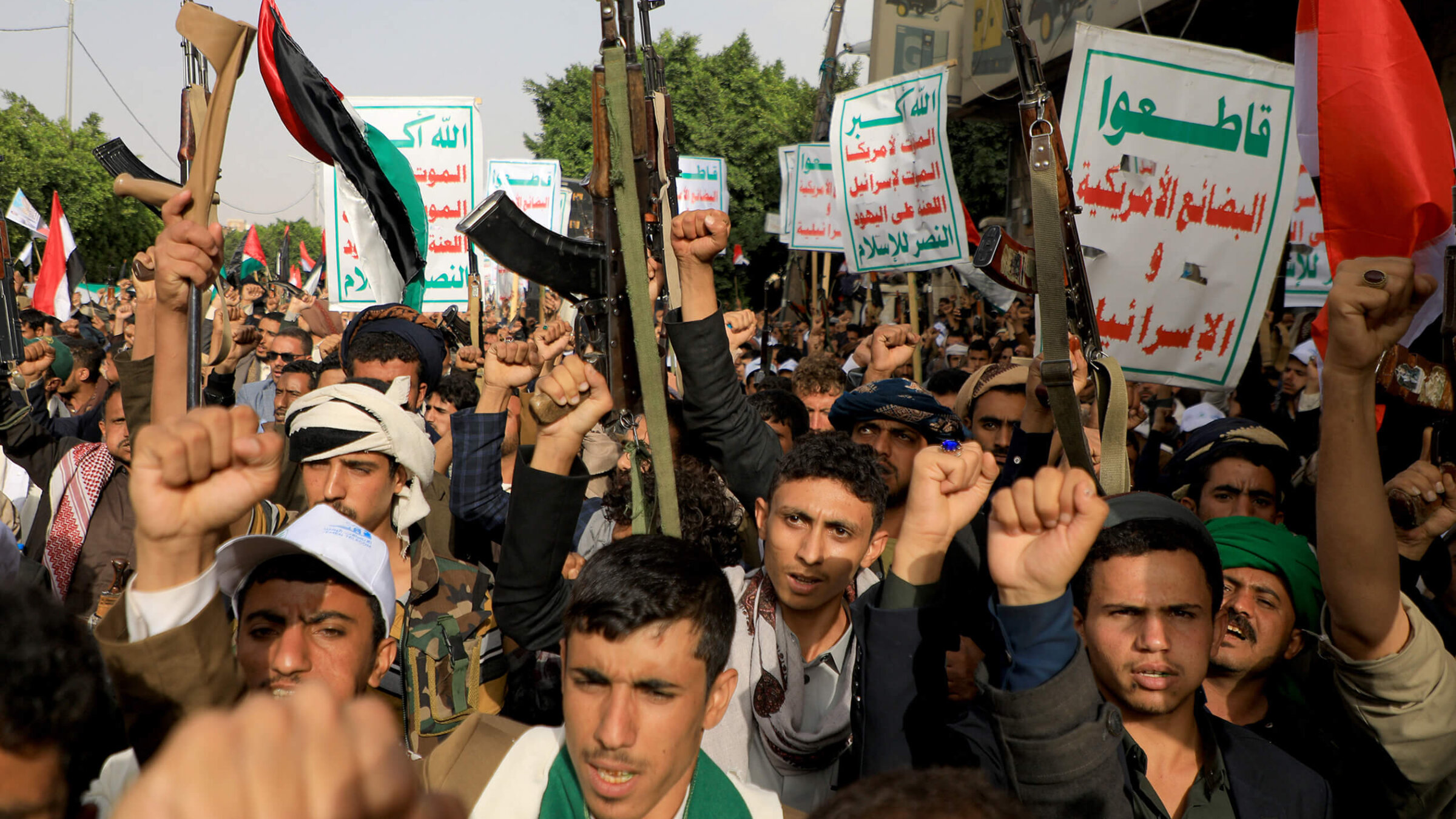Arab states call for restraint after Hamas attack — but some blame Israel
Iran, Qatar and Kuwait are among the Arab countries that suggested responsibility for the sudden conflict lies with Israel

People brandishing weapons take to the streets of Yemen’s Huthi-held capital Sanaa on Saturday in support of the Palestinians, after the militant group Hamas launched a surprise large-scale attack against Israel from Gaza. Photo by Mohammed Huwais/AFP via Getty Images
After Hamas launched a surprise attack on Israel from Gaza on Saturday, killing more than 250 Israelis and wounding upwards of 1,000, the world largely reacted with shock and dismay, and pleas for a quick resolution to the conflict.
In the Arab world, the picture was more complicated. Countries with which Israel has in recent years normalized ties, including the United Arab Emirates and Morocco, urged a cessation of violence on all sides, as did Saudi Arabia, with which Israel is currently working toward normalization. But a number of countries and political groups with whom Israel has no diplomatic relations blamed the conflict on Israel, and called for continuing violence.
A foreign ministry spokesperson for Iran, which is not an Arab state and is closely allied with Hamas, called the attack “the spontaneous movement of resistance groups and Palestine’s oppressed people in defense of their inalienable rights and their natural reaction to the Zionists’ warmongering and provocative policies.”
Here’s how Arab states and political parties have so far responded to the conflict.
Palestinian Authority
“We have repeatedly warned of the consequences of a deadlock in the political horizon and not granting the Palestinian people their legitimate right to self-determination and their state,” wrote the foreign ministry of the Palestinian Authority in a statement. “We have also warned of the consequences of the daily provocations and attacks, the continued terrorism of settlers and occupation forces, and the raids on Al-Aqsa Mosque and the Christian and Islamic holy sites.”
President Mahmoud Abbas declared that Palestinians have a right to defend against the “terror of settlers and occupation troops.”
Arab League
“Israel’s continued implementation of violent and extremist policies is a time bomb depriving the region of any serious opportunity for stability in the foreseeable future,” said Ahmed Aboul Gheit, Secretary-General of The League of Arab States, a coalition of 22 Arab countries. Gheit also called for “an immediate halt to military operations in Gaza” as well as “the cycle of armed confrontation between the two sides.”
United Arab Emirates
The UAE’s foreign ministry told its official news agency that the UAE “calls for the exercise of maximum restraint and an immediate ceasefire to avoid serious repercussions.” The foreign ministry also called for an international collaboration “to advance all efforts made to achieve comprehensive and just peace.”
Saudi Arabia
Saudi Arabia’s Ministry of Foreign Affairs called “for an immediate halt to the escalation between the two sides, the protection of civilians, and restraint.” It also issued a reminder of Saudi Arabia’s “repeated warnings of the dangers of the situation exploding as a result of the continued occupation, the deprivation of the Palestinian people of their legitimate rights, and the repetition of systematic provocations.”
Bahrain
Bahrain, with which Israel has normalized relations, “stresses the need for de-escalation among all parties to preserve the lives of people,” the Ministry of Foreign Affairs wrote in a statement. It also warned “that the continuation of violence will impede the efforts aiming at achieving a just and lasting peace in the Middle East” and called for the international community to work toward “establishing the Palestinian state according to the two-state solution and other international legitimacy resolutions.”
Qatar
The Qatari Foreign Ministry wrote that it “holds Israel solely responsible for the ongoing escalation due to its ongoing violations of the rights of the Palestinian people,” and called on “the international community to act urgently to compel Israel to stop its flagrant violations of international law, respect the resolutions of international legitimacy and the historical rights of the Palestinian people, and to prevent these events from being used as a pretext to ignite a new asymmetric war against Palestinian civilians in Gaza.”
Kuwait
Kuwait blamed Israel for “blatant attacks” against Palestinians. The Kuwaiti foreign ministry called for an international charge to “stop the provocative practices by the occupation.”
Hezbollah
The Iranian-backed Lebanese group said it was in “direct contact with the leadership of the Palestinian resistance” and called the attack a “decisive response to Israel’s continued occupation and a message to those seeking normalization with Israel,” according to Reuters. On Sunday, Hezbollah launched rockets and shells at three Israeli positions in the north that it considers Lebanese territory.
Egypt
Egypt’s foreign ministry “called for exercising the utmost restraint and avoiding exposing civilians to further risks, warning of serious repercussions as a result of the escalation of violence, which would negatively affect the future of truce efforts.”






















